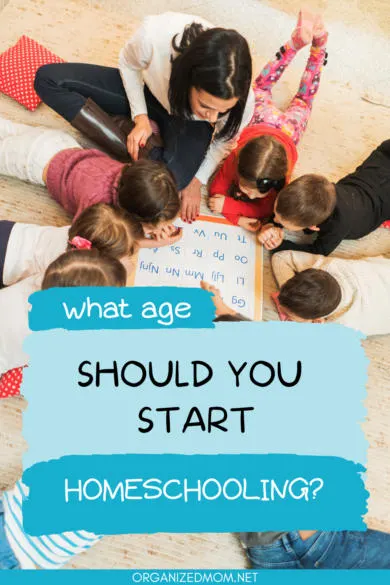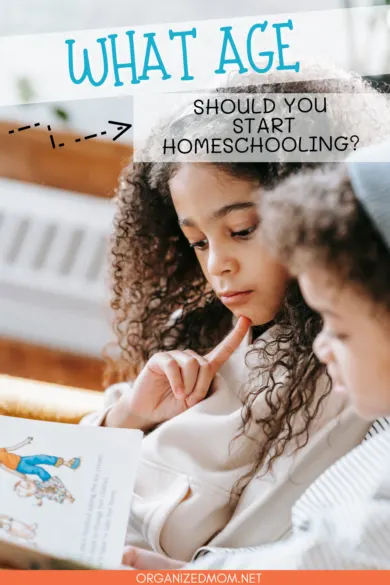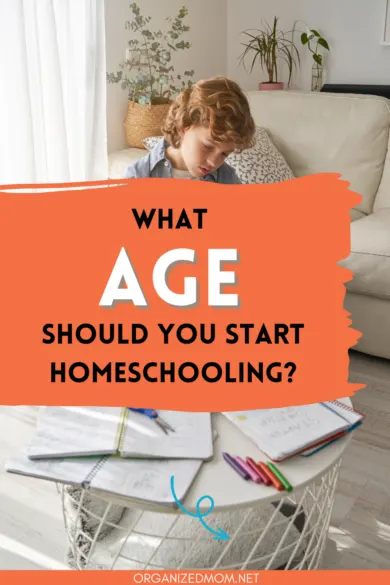Homeschooling is growing worldwide, and for centennials, this is the start of replacing the traditional 12 years of in-class learning. What age is best suited to homeschooling brings up various options for this alternative educational model that boosts child-centered learning. So, at what age should you start homeschooling?
Homeschooling can start at any age. Homeschool pundits say it even begins at birth. Kids learn the most in their first three years of life. Homeschooling drives models for continuous learning with the freedom to choose what to learn as high on the agenda. Different age groups have different needs.
Homeschooling advocates say age is secondary to the process of homeschooling. Kids have an innate interest in the world around them, ask questions, and can homeschool at any age. Homeschooling follows a child’s interest right from birth along a path of self-discovery and self-determinism. Some types of homeschooling can involve standard age-defined curricula.
What’s The Age To Start Homeschooling
Homeschooling is a progressive choice as parents push for their offspring’s future independence and a life-long way of learning. Education is being redefined with nearly 2 million homeschoolers of varying ages in the States. Kids’ innate aptitude for learning and desire to be homeschooled fuels the trend. But what age is good to start homeschooling?
Many agree that different age groups gain differently from homeschooling. So too, do the home environments and domestic circumstances influence homeschool readiness. Other parents feel more confident to shift from traditional in-classroom schooling if their kids at least have experience in conventional in-class learning and education.
Parents’ decision to move to homeschooling for their kids often is based on feelings that conventional schooling doesn’t recognize their kids’ potential. Their choices are to stick through elementary school and start at middle school or to have elementary and middle school as a basis and do high school homeschooling.
In terms of age, these formal schooling categories are:
- Elementary school (includes Kindergarten): ages 5-10 learn curriculum basics
- Middle school: ages 11-13 developed skills to time manage and learn
- High school: ages 14-18 become self-reliant
Parents often regard formal schooling as a basis for adapting to homeschooling. The above is an overview of what happens in terms of a kid’s in-class learning and achievements. For some parents who are considering homeschooling, these categories gauge their kid’s readiness to learn independently at home.
Homeschooling, in this case, is more like home-based learning and often follows the curriculum of public and private schools. In this case, parents or a tutor work with a fixed curriculum. The parents are tutor-mentors, and what they do is really school-at-home. This kind of home-based learning is different from that of homeschooling.
Signs your child is ready to start homeschooling
There are several signs that your child may show to indicate they’re ready to start homeschooling. Here are a few key indicators to look out for when deciding if now is the best time to start:
1. Independent Learning: If your child demonstrates a strong ability to learn and work independently, this is a great sign that they may be ready for homeschooling. It shows that they have the self-discipline and motivation to take charge of their own education and may be ready to start working on basic skills at home.
2. Curiosity and Interest: Is your child constantly asking questions and displaying a genuine curiosity for learning? This eagerness to explore new topics and engage with educational material is a positive indication that they are ready for the homeschooling environment.
3. Self-Motivation: Does your child take initiative in their studies and complete tasks without constant supervision? This self-motivation is crucial for success in homeschooling, as it requires a certain level of self-discipline and dedication.
4. Personalized Learning: If your child thrives in a more individualized learning environment where they can focus on their specific interests and learning pace, homeschooling may be a great fit for them. It allows for a personalized curriculum tailored to their unique needs, strengths, and can be altered to fit your child’s learning style.
5. Flexibility and Adaptability: Homeschooling requires flexibility and adaptability, as it often involves adjusting schedules, exploring various learning methods, and embracing different resources. If your child is open to change and can easily adapt to new routines, they may be ready for homeschooling.
Remember, each child is unique, and these signs may vary from one individual to another. It’s essential to consider your child’s specific needs and preferences when making the decision to start homeschooling.
Reasons to Homeschool
There are several reasons why parents might choose to homeschool their children instead of sending them to public or private schools. Here are a few:
1. Customized Education: Homeschooling allows parents to create a personalized curriculum tailored to their child’s unique needs and strengths. It provides the flexibility to focus on specific subjects or areas of interest, ensuring a well-rounded education. It’s also a great option for your child’s education if you want to make sure that you can control what your child learns, when they learn it, and how they learn it. This is not something that is typically controlled or influenced by parents in public school, but as a homeschooling parent, you are in control of what you choose to teach, or not teach your child.
2. Individualized Attention: With homeschooling, parents can give their children one-on-one attention, providing a supportive learning environment. This personalized approach can help children excel academically and emotionally and can be very beneficial, especially in the early years of learning.
3. Safe and Nurturing Environment: Homeschooling offers a safe and nurturing environment, free from the distractions and negative influences that can be found in traditional school settings. Homeschool parents have the opportunity to create a positive learning atmosphere that promotes their child’s well-being and happiness.
4. Flexible Schedule: Homeschooling provides flexibility in terms of scheduling. Parents can adapt the learning routine to accommodate their child’s interests, hobbies, and extracurricular activities. This flexibility allows for a balanced lifestyle and the opportunity to explore a wide range of educational opportunities outside of traditional classroom settings and can truly help cultivate a lifelong love of learning in your kids when it isn’t forced or pressured upon them and they can have extra time to do things they enjoy instead of being tied to a desk at school for 40+ hours a week. When you think about it, traditional schooling spends a lot of time doing things that aren’t actually educational. You may be surprised how fast you can get your homeschool schedule finished each day!
5. Strong Family Bonds: Homeschooling fosters strong family bonds as it allows parents and siblings to spend more time together. This close-knit environment encourages open communication, shared values, and a deep connection among family members.
6. Values and Beliefs: Homeschooling allows parents to instill and reinforce their values, beliefs, and moral teachings in their children’s education. It provides an opportunity to prioritize character development and impart important life skills and other great things that families may want to instill in their kids.
7. Individual Pace of Learning: Homeschooling enables children to learn at their own pace. They can delve deeper into subjects of interest or take additional time to master challenging concepts. This personalized approach ensures a comprehensive understanding of the material, ensuring that the child actually learns the information and doesn’t just get pushed through to finish a unit when they may not be ready to.
It’s important to note that homeschooling may not be suitable for everyone. Each family should carefully consider their unique circumstances and weigh the pros and cons before making a decision. Ultimately, the well-being and educational success of the child should be the guiding factors in choosing the best educational path.
There are also many ways to homeschool. This is important to realize, especially for new homeschoolers. School doesn’t have to be an all day event, you may be surprised to find out how fast you can finish the school day with your child in comparison to a traditional school day.
Homeschooling from the beginning
If you are considering homeschooling for your child and want to make it as smooth and painless as possible from a very young age, many will recommend to start homeschooling anywhere between 3-5 years old. This is when children are naturally curious and eager to learn, making it an ideal time to introduce them to the homeschool environment.
One of the main benefits of homeschooling at a young age is that you can tailor your child’s education to their individual needs and learning styles. This is not always possible in a traditional school setting where there are many students with varying abilities and personalities. In homeschooling, you have the flexibility to choose curriculum and teaching methods that best suit your child’s unique strengths and weaknesses.
Another advantage of starting homeschooling early is that it allows for a more hands-on approach to learning. Young children thrive on interactive activities such as games, crafts, and experiments.
These types of activities can be easily incorporated into lesson plans for subjects like math, science, and history. By engaging children in a fun and interactive way, they are more likely to retain the information and develop a love for learning.
Also, homeschooling at a young age can also foster a strong parent-child bond. Spending time together on a daily basis, working through lessons and exploring new concepts, creates opportunities for meaningful connections and bonding experiences.
This is especially important in the early years when children are developing their sense of self and building relationships with those around them.
Additionally, starting homeschooling early allows for a more personalized education. Parents have the ability to focus on their child’s specific interests and talents, allowing them to excel in areas where they may struggle in a traditional school setting.
This can boost confidence and motivation, as children feel seen and understood. Plus, you can assess them to see if they are performing at their natural grade level, below, or above it and make a plan to go from there. If they need more help “catching up”, then you can find a way to do that. If they need more of a challenge, you can find new ways to challenge them, use a different curriculum, or even move up a grade level or two.
The most important thing is, you are in control and can see when things are going well, or when they are not and you can adjust as necessary. Being involved with your child’s education from an early age is the best way to know exactly what they need and how to help them learn as much as possible.
If this age group has already passed, it’s not too late for you to start to homeschool your kiddo. In fact, it’s never too late to start homeschooling! Honestly, there really is no “right age” or best age. If you are considering it in elementary school, middle school, or even high school- if you think that’s the best option for your child, for whatever reason, then it’s a good idea to start homeschooling!
Remember that there are various ways you can home school too. Some are more hands on, and some are not. You can see what homeschool curriculum (or lack thereof) and methods work best for you and your family as you start your homeschool journey.
It’s also worth mentioning that you should look up your particular state laws to see what and how you have to notify your school district that you plan to homeschool your child in the coming year, or immediately, etc. Every area has different laws and requirements.
Responsible Homeschooling
Some parents favor responsible homeschooling as a break from formal schooling where grades and accreditation matters. Parents feel formal schooling isn’t focused on critical life-long skills that nurture kids’ talents and interests (see below). Homeschooling allows kids to broaden their interests and parents too can grow and learn.
The child’s interests are foregrounded in a parent- or tutor-led fashion. All aspects of a standard curriculum are brought in for a full-rounded understanding of a topic that interests a child. Parents take a child-centered approach, look at their kids’ skills, and include everyday happenings to help kids think wider than just their interests.
Each child is unique in their response to this form of learning, irrespective of their age. It’s a child’s uniqueness that’s embraced in homeschooling. Homeschoolers argue that kids (of all ages) need every opportunity to learn and achieve what they’re good at.
The feeling is that mainstream schooling dampens kids’ talent with an in-house school curriculum focused on competitive grades. And often, kids just don’t fit into the authoritative school system, and many even feel they’re dumb. Some are outright bored and disinterested.
Homeschooling From Birth
Homeschooling is chosen to bring out the uniqueness of each kid. Homeschooling was born from ideological thinking on the role of public and private schools in kids’ lives (and adults, too) in the seventies.
The proponents of this early thinking on homeschooling were the Austrian philosopher and social critic Ivan Illich, educationalists John Holt, and Dorothy and Raymond Moore. Explicitly, Illich’s work on ‘deschooling’ society drew attention.
Illich agitated for a form of learning that involved the freedom to choose what to learn. His thinking was adapted to learning at home. Specifically, his emphasis on life-long learning and what was absent from public and private school curricula drew Holt and Moore’s attention.
A forty-year-long journey now is progressively reforming learning. The classroom and a fixed school curriculum are no longer the be-all and end-all of learning. Homeschooling professes to unleash children’s inner creativity. The age of the kids’ awakening isn’t as important as acknowledging that kids can be homeschooled at any age and succeed. Some even say right from birth!
Homeschooling Nurtures Individual Talents
Responsible homeschooling looks beyond age and focuses on the milieu of the homeschooling environment. All ages benefit from learning at home, not by enforcing a top-down curriculum. Homeschooling at any age is child-centered. If a child likes worms and dirt, let them dig in the garden, start a worm farm and learn about organic gardening.
What appears like a lasses-fair approach to schooling is a learning stage. Kids’ individual talents are recognized, and this affirms a belief that your child will do well, even if they’re not at a traditional school!
The age at which homeschooling is started can be rigid and in line with achieving the age-specific goals of public and private schools. But this doesn’t need to be the case.
As mentioned, the environment in which the learning happens stretches beyond age groups. A five-year-old can work with a seven or even nine-year-old and learn. And mentors can be of varying ages and ethnicities too.
Encourage Play And Socialization
Some parents’ concern with homeschooling is the fear that kids are too young to be isolated and need to socialize. They refer to the socialization that happens at conventional public and private schools. They worry that homeschooling is too insular. Also, they are concerned that their kid is too young for homeschooling.
At schools, kids are in a group environment and play, run and explore together. This aspect lets parents think twice about homeschooling, especially for kids between 5 and 10 years old.
Proponents of responsible homeschooling have a different view and feel all kids can be homeschooled. The age of a child doesn’t matter. In fact, many kids never see the inside of traditional public or private schools. The homeschoolers learn to socialize through social cooperatives and attend social activities like:
- Dance and music lessons
- Church and Sunday School
- Field trips
- Sport and Drama
The response from homeschooling parents is that there’s no need to fear that young kids aren’t fit to be homeschooled. Homeschooling doesn’t happen in isolation; even the internet is an online community resource. So, the learning of ‘social fluency’ happens naturally and isn’t absent in homeschoolers. This choice doesn’t affect the age at which a kid is homeschooled.
Homeschooling At Different Ages
No doubt, homeschooling is an educational mindset that sets up values that favor individual learning over mass-mediated and mainstream education. The influence and following of homeschooling as a counter-learning model is spreading worldwide.
At the root of homeschooling’s popularity is its focus on a child’s personal development at any age. The kids’ innate aptitude for homeschooling is seen in their motivation from really small to want to learn. They are interested and ask questions. Homeschooling looks at praise as a reward. It’s not the diplomas that boost kids’ confidence or a lack thereof that bursts confidence.
Principles based on continuous learning stand out, and for homeschooling parents, the learning process starts at birth. Homeschool age-readiness is open-ended when thinking about which age is best. This is unlike in-classroom learning that’s regulated by age from Kindergarten upwards.
However, different ages also learn differently, like:
- Play for younger kids
- Structured activities for older children
Mostly homeschooling is chosen as a ‘positive’ social experience and a ‘safe’ learning environment.
Homeschooling After Pre-school
Often kids are sent to preschool as parents have not yet considered homeschooling. The age groups 2-5 learn through play and gross-motor skill exercises. At around five years of age, kids learn to recite the alphabet and look at numbers and shapes.
The most important part of starting at a preschool is playing with other kids. This can also be the most traumatic aspect when parents decide to homeschool (see below section on ‘making the transition’).
Homeschooling After Elementary Schooling
With a grounding in preschool and Kindergarten and going on to elementary school level, the 5-11-year-olds show their independence, even at school. At this age, the option of homeschooling might be difficult too. The kid might be used to the school environment, and the decision to homeschool might be foreign.
Some aspects to take into consideration include the following:
- Level of kid’s independence
- Their independent thinking skills
- Their learning style
The above will indicate how homeschooling must be rolled-out. Also, parents need to be aware that once a kid is enrolled at a school, they must officially withdraw from the school before starting homeschooling.
Homeschooling after elementary school (from 11 to 15 years) is a bit complicated as even the authority of parents or tutors can be challenged. Parents might even start to doubt their ability to facilitate homeschooling. This is why a network of homeschooling options exists, like homeschool co-ops and other programs to enrich learning.
The 15-18-year-old homeschooler, who has been at elementary school, can also benefit from exploring their talents and learning at home without peer pressure. For many, homeschooling at this stage is a stepping stone toward encouraging life-long learning.
The move from a conventional public or private school environment to homeschooling can be unsettling, though. The decision can be parent-directed or motivated by the child. But the adjustment might not be simple. The aim, of course, is a smooth transition (see below).
Parents As Facilitators Of Homeschooling
With homeschooling, the parents are the key influencers, and homeschooling looks at family circumstances, even access to technology, but mostly kids’ needs and interests. A kid’s individual strength and talent are boosted. Homeschooling is individual and child-centered irrespective of a kid’s age. Age is less critical than nurturing a kid’s desire to want to learn.
What makes homeschooling individual (and not driven by age, for example) is the freedom to do what’s good for your kid at any age. Parents help kids and families bond – homeschooling is a mutually beneficial learning curve.
The world is your oyster, takes on multiple meanings with homeschooling. Imagine a youngster, not in a school uniform, but a tee shirt, shorts, and sneakers with arms stretched open and ready to embrace the world and fly! Homeschooling is possible, and there’s no curb on age or what to learn.
Often it’s the parents who act slowly on getting homeschooling started. This is because they might be the products of conventional schooling. It might be that their kids start off in traditional public or private schools. And that homeschooling becomes their choice only when they are dissatisfied with the system.
A parent-facilitator aims to live the basic principle of homeschooling as life-long learning. Homeschoolinbecomesme tricky when kids are already in a conventional schooling environment and taken out.
Factors That Affect A Smooth Transition To Homeschooling
Whatever the motivation to do homeschooling, as seen above, you need to be aware of where your child stands concerning their unlearning of being at school. And remember, homeschooling is an option at any age.
Kids can leave school for homeschooling and go through a process of being ‘deschooled‘ – starting a continuous learning process. This happens when a child or a parent starts to value homeschooling and wants to make this change.
Of course, there are instances in which kids don’t get enrolled in the conventional schooling system and only know homeschooling. In this case, the uniformly fixed curriculum and rigid schooling are refused, and kids’ learning follows the homeschooling model. If this is not the case, moving from a conventional school to homeschooling can be a ‘big transition’ for newbie homeschoolers.
Some of the most common sentiments that mark this unnerving moment are:
- Kid experiences grief
- Loss of school as central and familiar
- Reasons for beginning homeschooling not clear
Kids don’t always move smoothly from school to homeschooling. They can grieve for friendships and even what’s been familiar to them. Whether this is Kindergarten, elementary or mid-schooling, parents need to recognize the kid’s grief. Mostly it’s a case of finding ways to supplement the loss of a school learning environment.
Interestingly, post-pandemic homeschooling demographics (predominantly white and rural before) have shifted to see Black and Hispanic learners as the ‘fasted growing homeschool demographic’. Factors influencing this move are school safety concerns, drugs, and peer pressure. Mostly it’s parents that spearhead the movement toward homeschooling.
Conclusion
Homeschooling is one of the fastest-growing movements in the States and worldwide. At this stage, schools still are chosen for younger ages. But increasingly, high school learners opt for homeschooling.
Clearly, trends are rising, and the conventional schooling model has a ready competitor: homeschooling. The age at which you’ll see homeschooling start is set to change too.
So, if you think now is a great time to start homeschooling your child, no matter what age they are, start looking at your local homeschool group, see what requirements your state has for homeschooling and get to planning the beginning of your homeschooling journey for you, your child, and the rest of your family!




